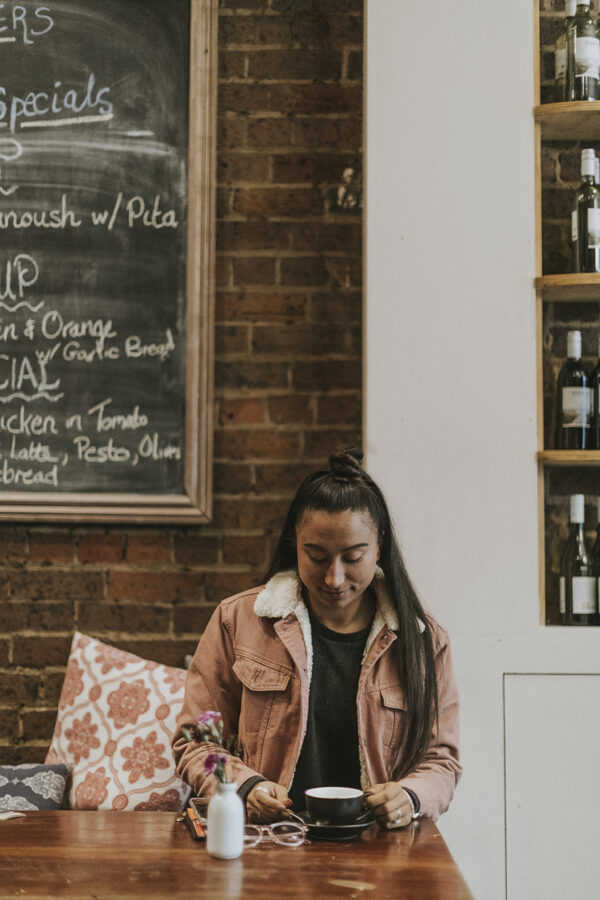In the third edition of Copa Coffee – and first with a W-League player – we caught up with Melbourne Victory’s Gulcan Koca at the rustic-chic Worker’s Food Room on Little Londsdale Street, around the corner from the PFA’s Melbourne offices.
☕
It was a fierce sibling rivalry with her brother Resul – four years her senior – that launched Gulcan Koca on her trajectory to become a professional footballer and ultimately fuelled her love for football.
Driven by their competitive nature, Gulcan decided at the age of nine to take up football in order to challenge her older brother.

The result? Gulcan – or ‘G’ as she is known in the football community – has carved out a successful and enviable football career that she is immensely proud of.
And she’s pretty happy that she overtook her brother in the process.
Now, after nine seasons in the W-League with Melbourne Victory, Gulcan is energised by that same adolescent enthusiasm that powered her childhood competitiveness to drive change within the game.
She hopes, after her experiences and sacrifices creating a life as a professional footballer, that she can move the game forward to improve the careers of the next generation of female players.

“I was born in Australia to Turkish parents. In Melbourne’s Turkish community there was a club called Dingley City and it was just the thing to do for us and other Turkish families to go and watch their senior men’s team play each weekend. We would spend time with the family and with the community.
“The club eventually started a junior set up and I really looked up to my brother at the time. He started playing so I thought, you know what, I’ll give it a shot. I wanted to eventually be good enough to have a kick with my big brother. He was always saying things like “you’re my little sister, you’re not good enough, what do you know” so I thought, you know what, I’ll give it a crack and see if I can take him on.
“In all honesty to start with I was absolutely hopeless. I had no skill, no football knowledge. In my first team, I was one of two girls. After the first week, the second girl stopped coming because it just wasn’t for her.”

“My skill level wasn’t where I wanted it to be, but through that drive and determination to be good enough to have a kick with my brother, I just slowly started loving the game.
“Every day after school I would kick the ball against the wall and kick the ball on my own at the primary school on weekends. After two years with the boys, I was still sitting on the bench.
“Two years after that the club decided to start a women’s team. That was the beginning.”

In the women’s team, Gulcan was placed in age groups two to three years her senior. Then she played her first senior women’s football match at the age of 14.
“I overtook my brother a very long time ago. He cut me a bit of slack over time. We’re all sweet now. He’s very proud of me and what I have achieved and what I have done so far, so he’s been extremely supportive and goes to watch all my games. I just had this persistence and grew to have this incredible love for the game that I never knew that I would have.”
G, an avid Victory fan, was devastated when she just missed out a professional contract in the W-League’s inaugural season. Her dad had previously sought a second job to support her ambitions in state teams and coming from a family that was not particularly well off, it was hard to justify the offer to join as a train on for no financial reward.

“I was asked to be a train-on but it was hard to be motivated to train five or six times a week and get nothing from it and your parents are having to give up time for it.
“Before I signed for Victory, I was a massive fan. Me and my friends would go to all of the matches and paint our faces blue. So there was extra motivation. To be able to actually play at the club that I admired so much as a young kid, was probably my biggest ambition at the time.”
G remembered how it had taken a huge amount of dedication and persistence to pursue her brother as 9-year-old. Instead of giving up, she pushed on. The next year, she got her breakthrough contract. The rest is history.
“I’ve now have played nine years straight at Victory, I’m the highest capped player so I’m pretty proud of how far I have come and what I have achieved in regards to that.”
Drawing on her playing experience – where she has had to contend with balancing training schedules with a double degree, overseas travel to Turkey every fortnight for three years to play with the Turkish national team and dealing with the rigours of a growing W-League – G wants to continue to push the boundaries.

While other domestic sports have recently started to drive awareness for women’s sport, G believes that football has always been the authentic sport for females in Australia, evidenced by the 10 years of W-League and the Matildas’ recent success on the world stage.
But she knows the job isn’t done yet. Far from it.
Working as Victory’s Club and Female Engagement Manager, G wants to help further promote football for females – and she’s trying to prove that same point that she proved to her brother all those years ago.
“When I play, I do play for the fun of it. But now as a collective, we’re also trying to prove a point that we are good enough to be at this level.
“The quality of the league and the quality of the players is lifting. In comparison to season two when I started with Victory, we now have the Matildas playing unbelievably, we have females championing change in the sport, players driving the standards.
“But our mentality isn’t to sit and wait for things to improve. Our mentality is that we’ll produce something good first and then no-one can give us an excuse as to why we don’t deserve it.
“As a female footballer, I’m just driven for the love of the game and it’s at a point to where we deserve recognition for our sacrifices.”
☕







